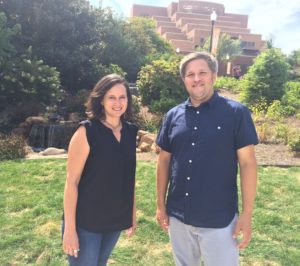
Civil and Environmental Engineering Assistant Professor Jon Hathaway and U.T. College of Social Work Professor Lisa Reyes Mason, are investigators on a $1.8M grant from the National Science Foundation.The multi-disciplinary, multi-institutional grant, titled Overcoming social and technical barriers for the broad adoption of smart stormwater systems, will be led by the University of Michigan. The proposal grew from a concern about urban flooding and climate change and will investigate social and technical barriers to the adoption of smart stormwater systems in four cities (including Knoxville) in a three-year study.
The goal of the project is to enable the next generation of smart and connected stormwater systems, which use sensors to anticipate changes in weather and the urban landscape, and adapt their operation using active flow controls (e.g. gates, valves, pumps). This will drastically improve community resilience to floods and water quality impairments, which have been increasing due to expanding urbanization and changing weather patterns.
Equipping stormwater systems with low-cost sensors and controllers will provide a cost-effective solution to transform infrastructure from static to adaptive, permitting it to be instantly “redesigned” to respond to changing system needs, as well as help minimize impact on aging infrastructure.
“Civil engineering, by its nature, has a big impact on humanity,” said Hathaway. “We do work that has an impact on society, so I think having our colleges work together is a natural pairing, and one with real world consequence. Together, we can hopefully break some of the barriers that have kept this idea from becoming adapted in a more widespread way. Water issues are an increasingly important topic, and one that our colleges are poised to tackle.”
“Understanding the social aspects of smart stormwater is a brand new area,” said Reyes Mason, adding some of the questions guiding the research: “What does the public think about these systems? What are the barriers to adoption? How do experiences with flooding or trust in local government matter? By forming an Advisory Committee and carrying out survey research in different cities, we hope to answer these questions and start to identify directions for policy and decision making in this critical area.”
This research proposal was in part motivated by the Grand Challenge of the National Academy of Engineering to “restore and improve urban infrastructure” as well as the College of Social Work’s Grand Challenge, which is to “create social responses to a changing environment, and aims to lay a foundation to empower communities to transform the way they handle runoff and flooding.